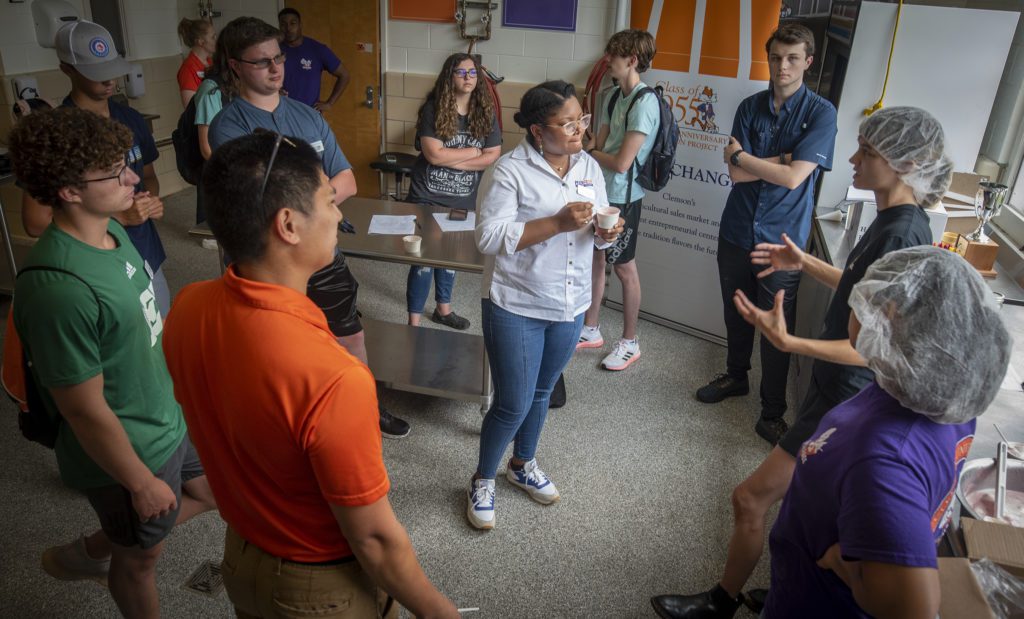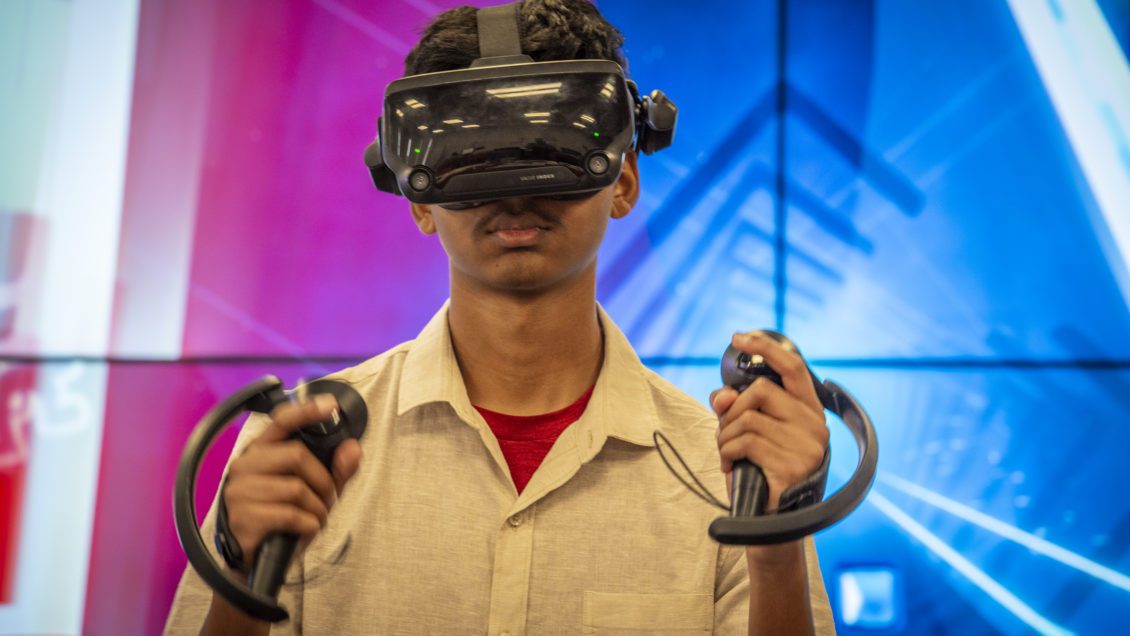Technology evolves at the speed of light in today’s world, creating a wealth of opportunity for engineers in STEM fields, but an undersupply of engineers to seize it threatens to slow the speed of progress.
Clemson University PEER & WISE and GE have teamed up to change that with GE’s Next Engineers program, which aims to increase the number and diversity of young people pursuing engineering career paths. (According to a recent study by the Pew Research Center, only 17 percent of STEM workers are African-American or Hispanic.)
On July 22, 54 11th-grade students in their first year of Engineering Academy Greenville, Next Engineer’s three-year program for 15- to 18-year-olds in the Upstate, visited the Clemson campus for a day of learning that was more like a trip to an amusement park than school.
The cohort broke into five groups and spent the morning in the Watt Family Innovation Center getting hands-on experience with the latest virtual reality gear in the Immersive Space, becoming familiar with 3D printing in the Makerspace and learning about the Watt Center itself, which is one of the most technologically advanced academic buildings in the U.S.
The morning’s exuberance level was particularly noticeable in the Immersive Space, where the students donned VR (Virtual Reality) goggles to create three-dimensional drawings with light or play a game with musical notes flying toward them. The sight of blindfolded students pawing at the air and spinning in circles while their peers stood to the side cheering them on made for an entertaining scene, but just as entertaining for these already tech-savvy students was the tour of the Clemson Energy Visualizations and Analytics Center (CEVAC). It is a room on the bottom floor of the Watt Center where a team monitors the carbon footprint of every building, structure and tree on the Clemson campus. When Tim Howard, director of the CEVAC, finished his presentation and asked if there were any questions, hands went up all over the room.
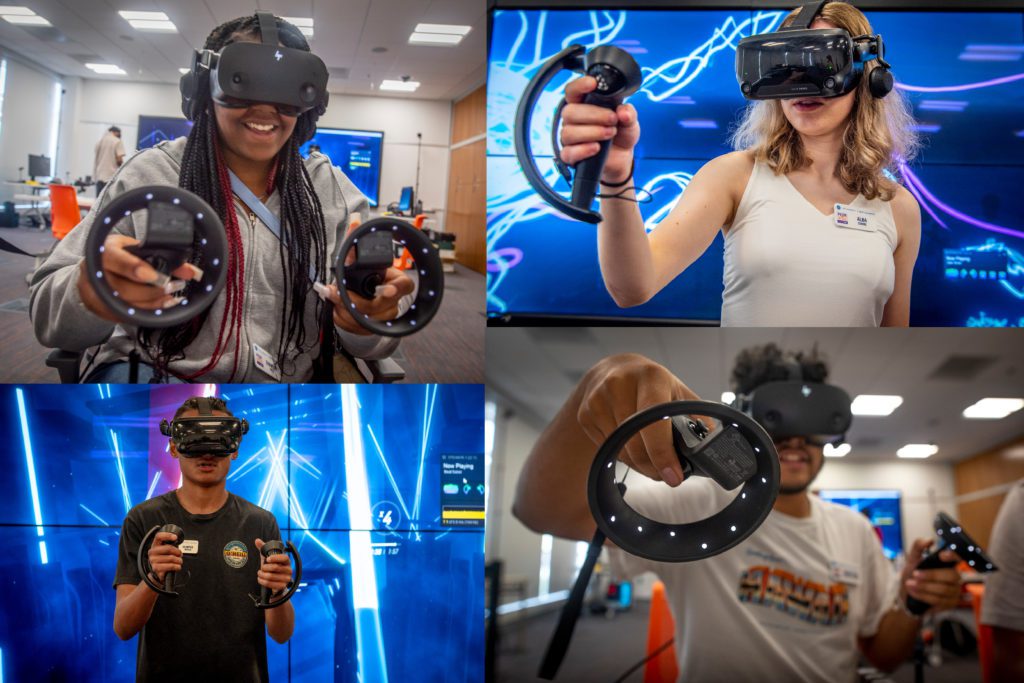
The new generation of prospective engineers are products of a different world than their forebears. For instance, participant Hadley Medeiros, a junior at Daniel High School, said the notion of becoming an engineer came to her via a streaming service.
“I’ve wanted to be a mechanical engineer since I watched the Imagineering documentary on Disney Plus,” said Medeiros. “It shows how they built the attractions at the Disney theme parks. I’d never even been in a robotics club or anything like that, but after watching that documentary, I said, ‘I want to do that!’”
Medeiros said she desperately wanted to get some engineering experience after that, and that’s how she discovered the Next Engineers program.
“I think it’s preparing me for the next step. I’ve learned that there are a lot of fields in engineering so at least one of them will be right for me,” she said. “It’s also been helpful with approaching real-world problems and figuring out how not to get freaked out by something that doesn’t work quite right or seems overwhelming. Plus, it has a nice scholarship opportunity!”
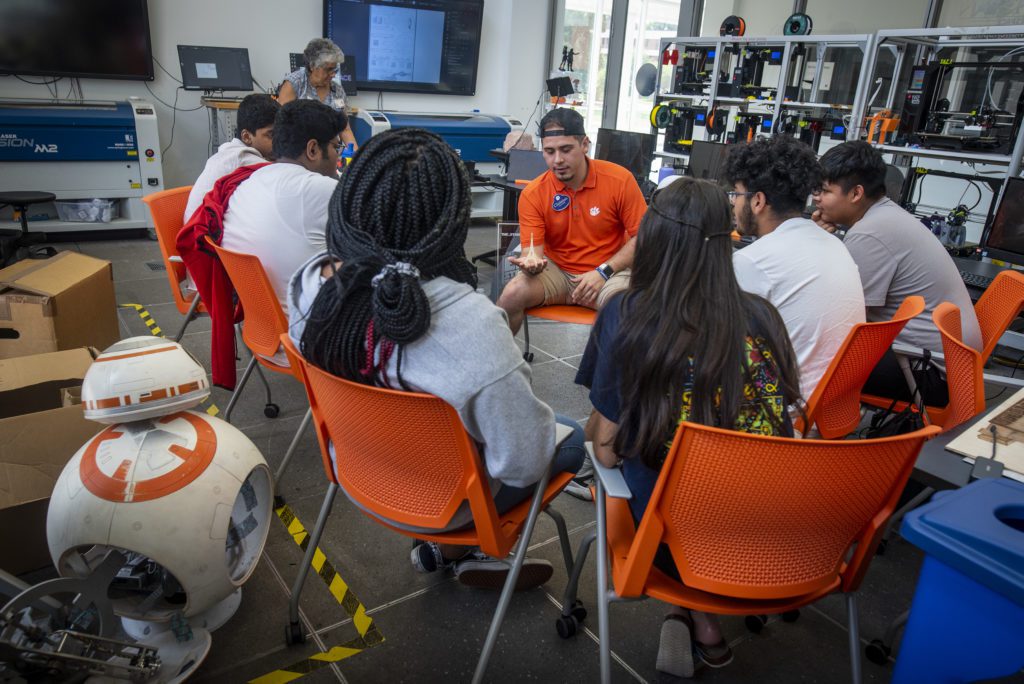
Ethan Garrett, a junior at Pickens High School, said he’d been surprised by the variety and hands-on nature of the workshops.
“There’s a lot of things I wasn’t expecting in the program,” said Garrett. “I wasn’t expecting as much hands-on stuff as there’s been. My favorite part is building the designs that we come up with. I’d say you’re wrong if you think engineering is boring and you don’t think it’s something you want to do. Try it first because, honestly, you get to build things and find solutions to problems you would never have thought of.”
For the afternoon session, the students walked from the Watt Center to Newman Hall, where they met several Food Science graduate students who ratcheted up the excitement with something that seemed decidedly not high-tech: ice cream.
The graduate students ushered the Next Engineers into one of Newman Hall’s food preparation and research rooms, where they were split into groups and instructed to invent their own flavors of ice cream. The flavor that got the most votes was made right there with the winning team helping with the process. The winning flavor for the first group was named “Apple of my Pie,” a confection with an apple strudel base, pie pieces and black raspberry. As it was being made, the graduate students filled the teens in on the surprisingly intricate science, logistics and technology that goes into food processing, packaging and distributing.
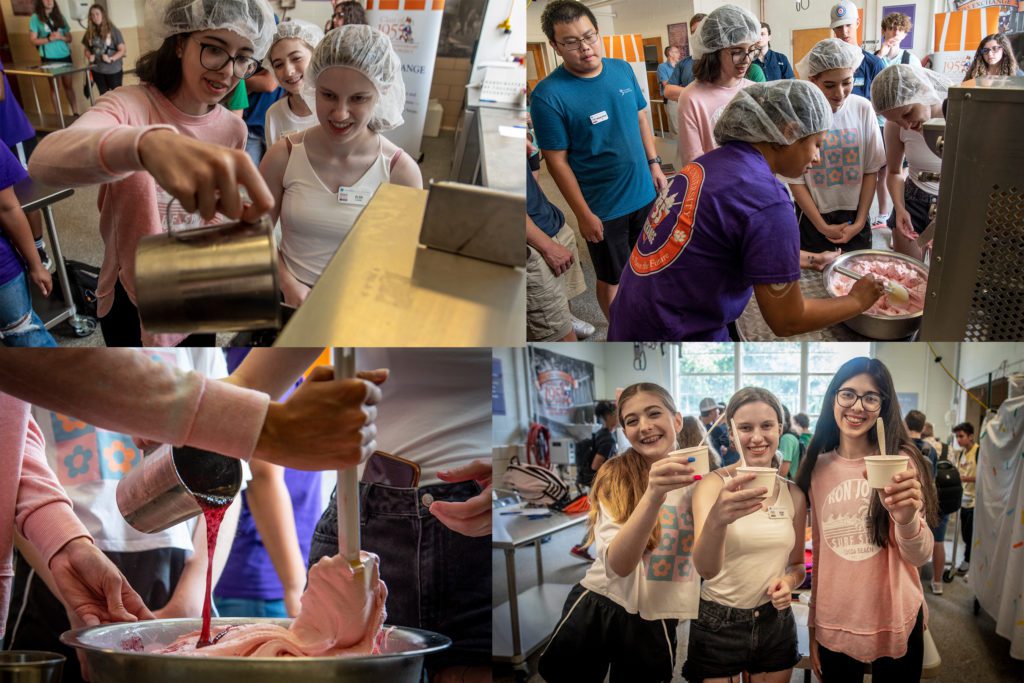
Next Engineers Greenville volunteer Dean Millare, a product definition engineer for GE who earned undergraduate and master’s degrees at Clemson in 2017 and 2019, stood in the open hallway looking into the room where the ice cream was being made and reflected on the impact he hoped the day’s events would have on the young students.
“The exposure to all these different ideas and applications is cool to see because I didn’t see this growing up,” said Millare. “It’s crucial for students looking at engineering as a possibility to have this opportunity, especially if they think engineering is just a bunch of math and science. There’s something for everyone in engineering. We’ve got problems in the world that we need to fix and engineers are the ones who will do it.”
Millare spent the day escorting the students with fellow GE volunteer Kevin McGovern, chief consulting engineer of transfer and thermal fluids at GE’s Greenville plant and a 1994 and 1996 Clemson mechanical engineering graduate.
“I think most kids don’t know what engineering is,” said McGovern, who was volunteering for the second time and whose daughter is in the program. “A career in engineering does not involve sitting at a desk and staring at a computer all day. That’s not what it is. Kids may see it as geeky, but they don’t understand the whole idea of problem-solving, interacting and tying everything together to make something.”

Next Engineers offers three programs for different age groups: Engineering Discovery for ages 13-14; Engineering Camp, a week-long camp experience for ages 14-15; and Engineering Academy for ages 15-18. GE operates the program at four global locations. Besides the one in Greenville that Clemson works with, which services Greenville, Pickens, Oconee and Spartanburg counties, there are hubs in Johannesburg, South Africa; Staffordshire, United Kingdom; and Cincinnati, Ohio.
Over three years, Engineering Academy students learn to think and act like engineers and prepare to advance to post-secondary education. With more than 80 hours per year outside of school, the Academy includes a series of immersive design challenges, career coaching and college-readiness workshops to equip youth with the skills they need to build an engineering identity and career. Students who complete the 80 hours per year of programming and enroll in a post-secondary engineering degree program receive a $20,000 scholarship from the GE Foundation.
Brittany Fatima Sanders, project manager for Next Engineers Greenville, Clemson PEER & WISE, said Clemson and GE make the perfect match for inspiring young people to reach their dreams.
“They come see me here at the University about two times a month, typically on Saturdays,” said Sanders. “We do engineering design challenges, they meet with faculty members and participate in activities like this to get them excited about being engineers, and it works. This partnership with GE’s Next Engineers program has proved invaluable in creating South Carolina’s next generation of leaders in engineering fields. I see its impact on these young people every time they visit our campus.”
